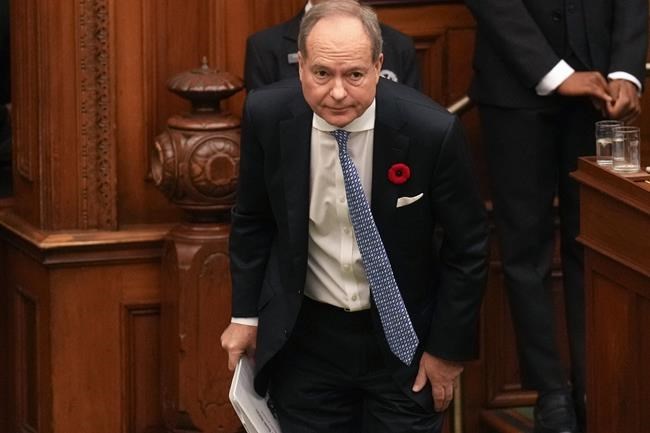TORONTO — Ontario tabled its fall economic statement Thursday that shows the province delaying its path to balance by a year and the government proposing to launch its own infrastructure bank to fund major projects. Here are the highlights:
Deficit
The province says there will be a larger than anticipated deficit for this fiscal year.¬Ý
The spring budget projected a $1.3-billion deficit this year, with the province then getting to balance in 2024-25 with a small surplus.¬Ý
But Finance Minister Peter Bethlenfalvy now says Ontario will be $5.6 billion in the red this year, with a $5.3-billion deficit next year, followed by a small surplus in 2025-26.
---
Ontario Infrastructure Bank
The province is launching the Ontario Infrastructure Bank, saying taxpayers cannot fund major capital projects alone. The province is contributing $3 billion in initial funding to get the arm's-length bank up and running.¬Ý
Ontario plans to target "trusted institutional investors" such as public-sector pension plan organizations.¬Ý
Bethlenfalvy says the projects funded through the bank will initially be focused on long-term care homes, energy infrastructure, affordable housing, municipal and community infrastructure and transportation.¬Ý
---
Invest Ontario Fund
The province is investing $100 million more into the Invest Ontario Fund, bringing it to a total of $500 million.¬Ý
The province says the money is used to attract companies to Ontario.¬Ý
The province cites a $3.1 million investment from the fund given to Mitsui High‚Äêtec, a motor parts manufacturing company, which invested more than $100 million to expand its capacity to build parts for electric vehicles.¬Ý
---
Water fund
The province is launching what it calls a new "housing-enabling water systems fund."¬Ý
Ontario will invest $200 million over three years into the fund that will be available for municipalities to apply to for the "repair, rehabilitation and expansion of core water, wastewater and stormwater projects that promote growth and enable housing development."
The province says the new fund will complement its recently announced "building faster fund," a $1.2-billion purse over three years available to municipalities to help them reach housing targets set by the province.
---
Contingency Fund
The province is squirrelling away billions of dollars to help it respond to surprise expenses.¬Ý
The province set aside $1 billion in its March budget for the year towards the contingency fund.¬Ý
It has now added another $2.5 billion to the fund this year, which now has a balance of $5.4 billion.¬Ý
---
Vaping Tax
The province plans to join the federal government's excise tax on vaping in an effort to fight the growing issue.¬Ý
The province says public health experts, the World Health Organization and the Canadian Cancer Society say taxation is a useful tool to reduce vaping.¬Ý
Research in the Canadian Medical Association Journal shows that for every six non-smokers, one person will begin smoking.¬Ý
---
Gas Tax Cut
The province announced earlier this week it would extend its gas tax cut for another six months.¬Ý
The province first cut the 5.7-cent tax in July 2022 and has extended it several times since.
The reduction and a 5.3-cent cut to the price of diesel fuel will remain until June 30, 2024.
---
Rental Housing
The province is scrapping its portion of the harmonized sales tax on new purpose-built rental housing construction.¬Ý
Ontario had been asking the federal government to drop its goods and sales tax on purpose-built rental housing for more than a year.¬Ý
The federal government did that in September and Ontario has officially joined them in an effort to spur construction in the rental housing market.
---
Mammograms
The province will be lowering the age for regular breast cancer screenings from 50 to 40, in an effort to detect cancer earlier.¬Ý
Health Minister Sylvia Jones announced the move earlier this week.¬Ý
The changes will mean an additional 130,000 mammograms each year.¬Ý
---
This report by The Canadian Press was first published Nov. 2, 2023.
Liam Casey and Allison Jones, The Canadian Press




